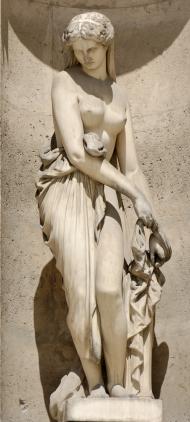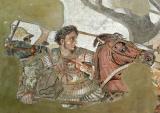誰がカンパスペとデートしましたか?
Alexander the Great 日付の カンパスペ ? から ?. まで
カンパスペ

カンパスペ(Campaspe, またはパンカステPancaste)は、アレクサンドロス3世(大王)の情婦で、古代世界で最も偉大な画家という名声のあったアペレスの絵のモデルとなった。そのエピソードはプリニウスの『博物誌』に記録された事実かどうかは怪しい交換の逸話の原因となった。その裸体画の美しさを見たことで、アレクサンドロスは画家が自分以上にカンパスペを理解し、そして愛していることを感じ取った。そこでアレクサンドロスは絵を受け取ったが、カンパスペをアペレスに与えた。「アレクサンドロスは彼にカンパスペをプレゼントとして与えたが、それはあらゆるパトロンで最も気前のいい贈り物で、ルネサンスまでパトロネージュと画家たちの模範とされた」とロビン・レイン・フォックスは述べている。
アペレスはカンパスペを彼の最も賞賛された絵画である『海より出づるアプロディテ』のモデルとしても使った。それは図像上のウェヌス・アナデュオメネで、「髪を絞り、したたる水滴が彼女の体の周りに透き通った銀色のベールを形作っていた」(ペック、1898年)。
カンパスペは我々の知るアレクサンドロスの生涯に関する五つの主要な典拠には現れない。アレクサンドロスの現代の伝記作家ロビン・レイン・フォックスは彼女の言い伝えを『博物誌』のプリニウスやサモサタのルキアノス、ウァリア・ヒストリアのアエリアヌスといったローマの著述家までさかのぼった。彼らはカンパスペがテッサリアのラリッサの著名な市民であったことを究明した。アエリアヌスは彼女が若いアレクサンドロスに愛の手ほどきをしたと推測している。
カンパスペは男にとっての恋人の総称的な詩における同義語となった。イギリスの大学才人で詩人のジョン・リリー(1553年–1606年)は1584年に喜劇『カンパスピ』を著し、また次の詩も著した。
- キューピッドと私のカンパスピが
- キューピッドの払うキスのためにトランプ遊びをした
- 彼は矢筒と弓と矢を賭ける
- 彼の母の鳩と雀の群れも
- 失い、それから引き渡す
- 彼の唇の珊瑚と
- ほおで育つ薔薇(だがどのようにかは誰も知らない)
- これらとともに、額のクリスタル
- おとがいのえくぼ
- これらはすべて私のカンパスピが勝ち取った
- 最後に彼は彼女を見つめた
- 彼女が勝った、盲目のキューピッドは飛び立った
- おお愛よ! 彼女は汝にこれをなしたのか?
- 私は、ああ! どうなってしまうのか?
スペインの劇作家ペドロ・カルデロン・デ・ラ・バルカはカンパスペの物語から『すべてを与えて、何も与えず』(Darlo todo y no dar nada, 1651年)を著した。
続きを読む...Alexander the Great

Alexander III of Macedon (Ancient Greek: Ἀλέξανδρος, romanized: Aléxandros; 20/21 July 356 BC – 10/11 June 323 BC), most commonly known as Alexander the Great, was a king of the ancient Greek kingdom of Macedon. He succeeded his father Philip II to the throne in 336 BC at the age of 20 and spent most of his ruling years conducting a lengthy military campaign throughout Western Asia, Central Asia, parts of South Asia, and Egypt. By the age of 30, he had created one of the largest empires in history, stretching from Greece to northwestern India. He was undefeated in battle and is widely considered to be one of history's greatest and most successful military commanders.
Until the age of 16, Alexander was tutored by Aristotle. In 335 BC, shortly after his assumption of kingship over Macedon, he campaigned in the Balkans and reasserted control over Thrace and parts of Illyria before marching on the city of Thebes, which was subsequently destroyed in battle. Alexander then led the League of Corinth, and used his authority to launch the pan-Hellenic project envisaged by his father, assuming leadership over all Greeks in their conquest of Persia.
In 334 BC, he invaded the Achaemenid Persian Empire and began a series of campaigns that lasted for 10 years. Following his conquest of Asia Minor, Alexander broke the power of Achaemenid Persia in a series of decisive battles, including those at Issus and Gaugamela; he subsequently overthrew Darius III and conquered the Achaemenid Empire in its entirety. After the fall of Persia, the Macedonian Empire held a vast swath of territory between the Adriatic Sea and the Indus River. Alexander endeavored to reach the "ends of the world and the Great Outer Sea" and invaded India in 326 BC, achieving an important victory over Porus, an ancient Indian king of present-day Punjab, at the Battle of the Hydaspes. Due to the mutiny of his homesick troops, he eventually turned back at the Beas River and later died in 323 BC in Babylon, the city of Mesopotamia that he had planned to establish as his empire's capital. Alexander's death left unexecuted an additional series of planned military and mercantile campaigns that would have begun with a Greek invasion of Arabia. In the years following his death, a series of civil wars broke out across the Macedonian Empire, eventually leading to its disintegration at the hands of the Diadochi.
With his death marking the start of the Hellenistic period, Alexander's legacy includes the cultural diffusion and syncretism that his conquests engendered, such as Greco-Buddhism and Hellenistic Judaism. He founded more than twenty cities, with the most prominent being the city of Alexandria in Egypt. Alexander's settlement of Greek colonists and the resulting spread of Greek culture led to the overwhelming dominance of Hellenistic civilization and influence as far east as the Indian subcontinent. The Hellenistic period developed through the Roman Empire into modern Western culture; the Greek language became the lingua franca of the region and was the predominant language of the Byzantine Empire until its collapse in the mid-15th century AD.
Alexander became legendary as a classical hero in the mould of Achilles, featuring prominently in the historical and mythical traditions of both Greek and non-Greek cultures. His military achievements and unprecedented enduring successes in battle made him the measure against which many later military leaders would compare themselves, and his tactics remain a significant subject of study in military academies worldwide. Legends of Alexander's exploits coalesced into the third-century Alexander Romance which, in the premodern period, went through over one hundred recensions, translations, and derivations and was translated into almost every European vernacular and every language of the Islamic world. After the Bible, it was the most popular form of European literature.
続きを読む...